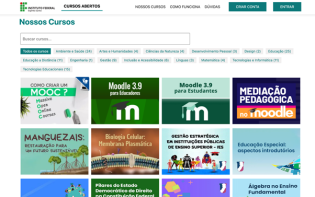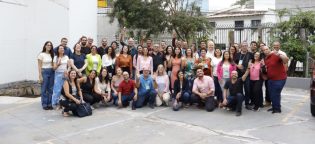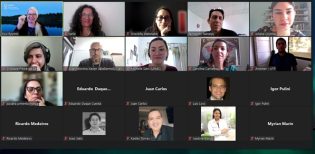Tutor Training of the Embrace Project at Ifes
Published 23 April 2025
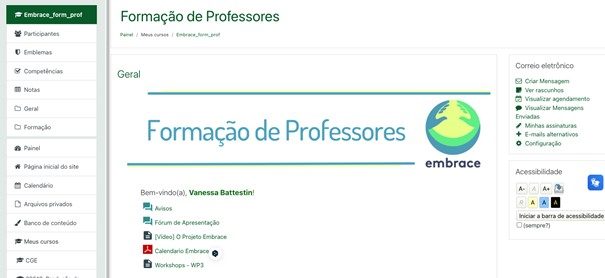
Photo by: IFES Team
Between May and December 2024, Ifes implemented tutor training under the Embrace Project, enhancing teachers’ digital and pedagogical skills through MOOCs. The initiative fostered educational innovation and workplace alignment, empowering educators as multipliers of modern teaching practices across campuses, with strong participant engagement and promising long-term impact.
Authors:
Vanessa Battestin
Juliana Cristina Andrade
Marize Lyra Silva Passos
Between May and December 2024, the Federal Institute of Espírito Santo (Ifes) carried out an innovative training program aimed at teachers, as part of the international Embrace project, supported by the European Erasmus+ programme. The main goal was to develop digital and pedagogical competencies, enabling teachers to act as multipliers on their campuses, promoting educational practices more aligned with the 21st century and the world of work.
Embrace is a project that brings together institutions from Brazil, Finland, Portugal, and Colombia. It aims to promote reforms and modernization in Higher Education Institutions (HEIs) so that they become catalysts for economic and social development in their contexts. The tutor training at Ifes was conducted through a combination of synchronous meetings and massive open online courses (MOOCs), along with asynchronous activities and guidance provided via a virtual classroom on the Ifes Moodle platform.
The training was structured according to the themes of the MOOCs:
- MOOC 1 – Digipeda: Digital and Pedagogical Competencies
- MOOC 2 – Active Pedagogies Using Digital Tools
- MOOC 3 – World of Work: Digital Competencies and Innovation
In addition to addressing these themes, the MOOCs also promoted the development of digital competencies based on the European Framework for the Digital Competence of Educators (DigCompEdu). The goal was not to cover all digital competencies in full, but rather to address key areas, as illustrated in Figure 2. These areas were:
- In MOOC 1: Area 2 (Digital Resources) and Area 4 (Assessment)
- In MOOC 2: Area 3 (Teaching and Learning) and Area 5 (Empowering Learners)
- In MOOC 3: Area 1 (Professional Engagement) and Area 6 (Facilitating Learners’ Digital Competence)
Engagement and Development of the Tutors
The training involved 43 tutors, of whom 17 completed all activities and 19 participated partially. Despite the involvement of campus management in selecting participants, the lack of dedicated hours for the training may have affected the overall completion rate.
Throughout the program, the teachers were challenged to design action plans to apply the knowledge they acquired in their institutional settings — that is, on their own campuses — in order to multiply the impact of the training. The process followed a progressive structure: starting with the development of digital competencies, moving on to pedagogical skills, and finally integrating these with the world of work.
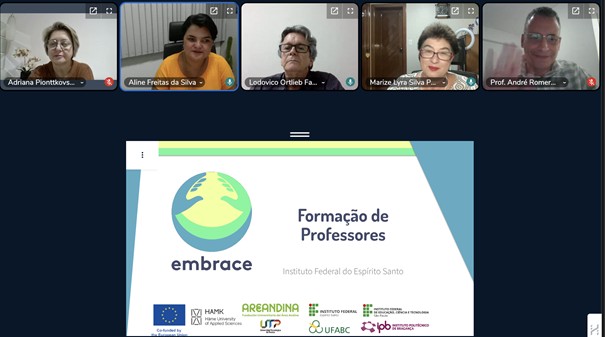
Application Plans: Innovation and Teaching Practice
Across different campuses, the action plans included a variety of initiatives, such as:
- Workshops on digital tools, gamification, and copyright;
- Thematic sessions and discussion circles focused on personalized learning;
- Practical application of active methodologies in the classroom
- Creation of interactive digital materials and the use of artificial intelligence;
- Evaluations through questionnaires and self-assessment tools such as the DigCompTest;
- Seminars and experience-sharing sessions among faculty members
Campuses such as Viana, Colatina, Santa Teresa, Cachoeiro, and Cefor developed comprehensive plans that ranged from technical training to organizing events for the exchange of best teaching practices.
Participant Feedback
The training was mainly based on the three MOOCs completed by the participants, which received highly positive evaluations. Most participants considered the videos and reading materials adequate, and the course content well-organized. The average recommendation score was 9 out of 10, indicating a high level of satisfaction.
The main suggestions for improvement included:
- Reorganizing the sequence of modules for better coherence;
- Fixing broken links and standardizing video subtitles;
- Redesigning assessment activities to make them more challenging and interactive.
These feedback points were essential for refining the MOOCs before their public release.
Results and Future Perspectives
By the end of the training, there was a clear evolution in how teachers understand and use digital technologies in their educational contexts. The main advancements observed include:
- A strong focus on educational innovation and AI, preparing teachers to create interactive digital content;
- Practical application of active and digital methodologies in real classrooms, enhancing personalized learning experiences;
- Increased engagement among teachers through seminars and collaborative meetings to share experiences;
- Integration with the job market, allowing teachers to better prepare students for digital careers;
- Ongoing monitoring and impact assessment, ensuring that the competencies acquired through the MOOCs are effectively applied in teaching practice.
Through this experience, Ifes moves forward in its mission to promote education that is connected to contemporary needs. It is expected that teachers will continue to modernize their practices, contributing to a more innovative and future-oriented learning environment.
